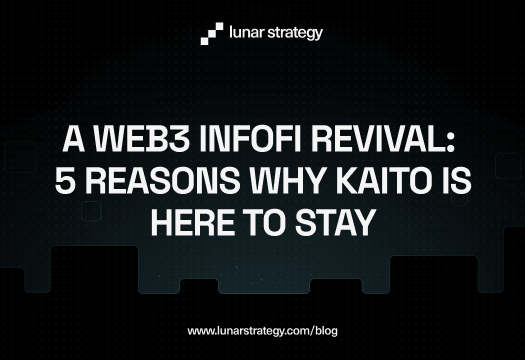What defines an Influencer?
Influencers are individuals who have a large following on social media or other online platforms, and who can use their influence to promote products, services, or ideas to their audience.
The rise of new technology, such as blockchain and other web3 technologies, has created opportunities for influencers to partner with businesses in the blockchain space and promote their products and services to a wider audience.
Many content marketing teams in Web3 are looking to influencers with large followings to help spread the word about their products and services and build brand awareness.

In addition to promoting products and services, influencers can also help businesses in Web3 to showcase new features and innovations in technology. Some influencers will create content such as a blog post on your behalf, most however will simply post content that marketers have prepared for the purpose.
As the blockchain industry continues to evolve, industry leaders with a deep understanding of the technology and its potential can play a crucial role in helping businesses and marketers to showcase the benefits of blockchain and web3 technologies to a wider audience.
Overall, influencers can be an effective way for businesses in the blockchain space to reach a large and engaged audience and promote their products, services, and innovations to the next generation of internet users.
What is Influencer Management?
Influencer management is a relatively new discipline in digital marketing. In recent years, it has become an important component of marketing strategies across many industries. The main aim is to help clients to reach a warm and engaged audience.

Of course, the practice has been part of legacy marketing for as long as there have been famous people. Having someone with a large audience recommend your company can be a powerful way to grow a reputation in today's busy world.
Just as with other elements in marketing, the concept of influencer marketing has evolved over time. With the rise of social media platforms in the early 2010s and the growth of influencers on these platforms, influencer marketing quickly became a key part of Web2.
As more and more businesses began to recognize the potential value of influencer marketing, the need for effective influencer management has grown, and the discipline has continued to evolve and become more sophisticated over the past decade.
Web3 Influencer Marketing

With the dawn of Web3, influencer marketing has really come into its own. Initially, many traditional marketing platforms blocked advertisers from running paid ads. As a result, influencer marketing strategies were a primary source of new leads for crypto community development.
This trend has continued and as marketers begin to engage with Web3 communities, the realization continues to grow that this growing industry is all about the users. The success or failure of Web3 projects hinges on the strength of their community.
Bad actors damage reputations
In fact, some projects have even launched with tremendous success, only to taper out as users discover that the value promised was significantly lower than what was delivered. But those are the short-term focused projects that were part of the early days of an emerging industry.
The recent presence of weaker projects has hindered some Web3 influencer marketing leaders' reputations, and as such, they have become more careful about who and what they are willing to promote. The best industry leaders stop at nothing to protect their community, and that's where a great influencer manager comes in.
The Value of Influencers
An influencer has the power to make a big impact on community growth and your brand's reputation. This is because their community trusts them. Influencer management is important in digital marketing because influencers have the ability to reach a large and engaged audience on social media and Web3.
By collaborating with respected leaders who are relevant to your target market, your project can tap into the influencer's audience and gain exposure for your brand. Influencer marketing can also be more effective than traditional forms of advertising because influencers are seen as more trustworthy and authentic by their followers.
This can help to build trust and credibility for a brand rapidly, and ultimately lead to increased sales, revenue, and of utmost importance in Web3 - community growth.
As more and more businesses have begun to recognize the potential value of influencer marketing, the need for effective influencer management has grown, and the discipline is now a key role within Web3 agencies.
Influencer Management as an Agency Role
Influencer management involves identifying and working with social media influencers to promote a brand or product. The influencer manager may also be the sole agent for specific influencers - protecting the influencer from representing weak brands or high-risk projects.

An influencer manager may have a number of different roles on a daily basis, including
- identifying relevant influencers in a particular industry or niche
- negotiating collaboration agreements
- managing the relationships with influencers to ensure that they are effectively promoting the brand or product.
- representing their influencer relationships to clients
- representing clients to potential influencers
The goal of influencer management is to leverage the reach and influence of social media influencers to help a web3 project gain exposure and engagement with its target audience - while protecting both parties from unnecessary risk.
Risks of Using the Wrong Influencer
Using the wrong influencer for a marketing campaign can cause damage to your brand's reputation. The potential to lose control over the message being promoted is very real, especially if you don't have an existing relationship with the influencer in question.
For example, an influencer may say or do something that damages your brand's reputation, or they may not disclose their relationship with your brand, which could break trust later with your users.
Additionally, there is a risk that the influencer may promote your Web3 project in a way that is not in line with your marketing strategy. This could actually damage the message of your project, or change it up completely.
These risks can be mitigated by partnering with an influencer manager with a long-term relationship with select key individuals and the time and experience to manage the relationship with them effectively.

Risks an Influencer must Consider
Influencers face several potential risks when partnering with a web3 business. One risk is that the web3 business may not be reputable or trustworthy, and could potentially harm the influencer's reputation by association.
Another risk is that the web3 business may not have a viable product or service, which could lead to the influencer promoting something that ultimately fails or is not well-received by their audience.
Additionally, old-school influencers may not fully understand the details of the partnership or the product or service being promoted, which could lead to misunderstandings or disputes down the line.
It's important for influencers to carefully research and vet any web3 business they are considering partnering with to ensure that they are working with a reputable and trustworthy company.
All of these very real challenges are the reasons effective managers have such a key role to play in the new world of web3 influencer marketing.
Trusting your agency
At Lunar Strategy we have a team whose sole focus is influencer marketing. These professionals spend significant amounts of time on social media platforms testing and trying to identify influencers who are able to effectively communicate on behalf of our clients.

Some influencers are specialists in a particular field or industry, while others are known for their personal style or lifestyle. Some influencers have their main audience on a specific social media platform, while others have a more diverse following across multiple platforms.
Some influencers focus solely on creating original content, while others primarily share and promote content created by others. Overall, influencers can be categorized based on their niche, platform, content, and audience.
Influencers with larger audiences normally have an agent who you'll need to work through. There are also some platforms that offer an index of influencers and the kind of projects they are willing to promote - including their estimated fees and requirements.
All of these are considerations taken into account by your key account manager to build out your influencer marketing strategy. Our team must consider your budget and timelines and work with you to determine who, how, when, and where your influencer marketing strategy is going to be implemented.

One of the most important things to remember when you are considering launching these types of marketing campaigns is to trust the agency and influencer manager when they brief you on available options.
Defining a Goal
Gone are the days of paying once off for someone to mention your name, and sitting back as the users sign up. People are used to being sold to these days, and they expect a lot more from businesses than just a simple mention can deliver.
Creating content that adds value to your audience can boost your influencer marketing campaigns and turn a mention into a powerful lead-generation strategy. It's important to review your business goals before launching an influencer campaign. Discuss these with your content creator as part of a holistic marketing strategy.
Collaborating with influencers to promote a product, service, or idea to their audience can be done through sponsored posts, product reviews, or other forms of content created by the influencer.
With blockchain technology, you may be able to draw additional users through promotions around digital assets and make the most of trending stories in delivering next-generation influencer marketing campaigns. Consider what partnerships, strategies, trends, and data are available for you as you define your goals and scope for your influencer campaign.
Kinds of Influencers
There are several different types of influencers, each with their own unique reach and engagement.
One of the most common types of influencers is micro-influencers. These are individuals with a relatively small following, usually between 1,000 and 100,000 followers. While they may not have the same reach as larger influencers, micro-influencers often have highly engaged followers.
Micro-influencers can be highly effective at promoting web3 products or services to their audience - and often at a relatively affordable contract rate.

Another type of influencer is the macro-influencer. These are individuals with a large following, often over 100,000 followers. They tend to have a wider reach than micro-influencers and can be effective at promoting products or services to a larger audience.
While their followers may not be as engaged as those of micro-influencers, the sheer numbers mean that their reach is much more significant. Unfortunately, most macro-influencers are aware of the power of their platform and charge accordingly.
In addition to individual influencers, there are also organizational influencers. These are organizations or institutions with a significant following on social media or other online platforms.
They can be highly effective at promoting products or services to their audience but may be more difficult to approach and work with than individual influencers.
Web creators, such as bloggers, vloggers, and social media personalities, are a common type of influencer. These creators often have a strong connection with their audience and can provide valuable insights and recommendations to their followers. Many Web3 companies work with web creators on YouTube, Twitter, and other social media platforms to promote their products and services.
To identify the right influencers for your brand, measuring their reach and engagement is important.
- Reach is the number of people an influencer can potentially reach with a single post or other pieces of content.
- Engagement is the level of interaction and response an influencer's followers have with their content.
Both reach and engagement can be measured using tools and metrics provided by social media platforms or other influencer marketing platforms.

Finally, you need to consider the relevance of the audience. A micro-influencer with an engaged audience who are your perfect potential users will be a far better partner than a macro-influencer with an audience in a completely different country or genre.
Relevance is a vital consideration.
Examples of Influencer Applications and Software
There are quite a few online platforms that offer influencer management services. Unfortunately, most of these are legacy solutions for Web2 - but as we've covered in other articles, sometimes we need to be seen there in order to bring audiences across to new innovations on the Web3 front.
Some examples include:
- Upfluence - is a platform that exists to help you to find and collaborate with influencers to promote your traditional products and services.
- AspireIQ - helps you to find, manage, and track your campaigns. They aim to make it easy for businesses to collaborate with influencers and effectively promote your project.
- Neoreach - platform allows businesses to search for influencers based on their audience size, engagement rate, and other metrics and provides management tools as well.
These are just a few examples of influencer management websites that can assist with managing your campaigns. Beware though of trying to negotiate without the right experience as it may turn out to be a costly affair. Hopefully, the discussion above will help you to have the basics covered!
Summary
Why Work with Influencers
Working with influencers can have many benefits for companies. In addition to reaching a large and engaged audience, influencer marketing can help to establish trust and credibility with potential customers and clients. It can also drive sales and promote brand awareness in the market. Overall, influencer marketing can be an effective way for companies to connect with their target audience and build relationships with potential customers - the key is to manage the relationship efficiently!
Why use an experienced Influencer Manager
An experienced Influencer manager will have traveled down the road of engaging and testing various influencer marketing strategies over the years. They will have built up some level of rapport with relevant influencers, and also understand the requirements of negotiations and expected rates which represent fair value for their clients and the influencer themselves.
An influencer manager must work hard to keep both parties satisfied with the campaign and with the results of any promotions carried out. Whether it's Facebook posts, Facebook Lives, YouTube video, or Twitter threads - wherever the content is being shared, the perfect influencer manager must stay on top of whatever is happening and the reach and engagement level that results.

Experience Protects You
In closing, we believe you'll have a much better idea of some of the complexities of managing an influencer relationship. Our extensive experience in both Web3 and legacy influencer management is golden for our clients.
Our team is available to help you get the most out of your marketing budget - simply book a call via our Contact form to send a short brief of what you are trying to achieve.
We are a fast growing agency. Partly because we respond to every message!
If you want to achieve the best results from your Influencer marketing Campaigns - take the time to download and study the Lunar Academy's guide: https://www.lunarstrategy.com/guides/success-with-influencer-marketing-in-web3
Other articles you may be interested in:













Subscribe to receive recent articles
.webp)




















.png)

.webp)











